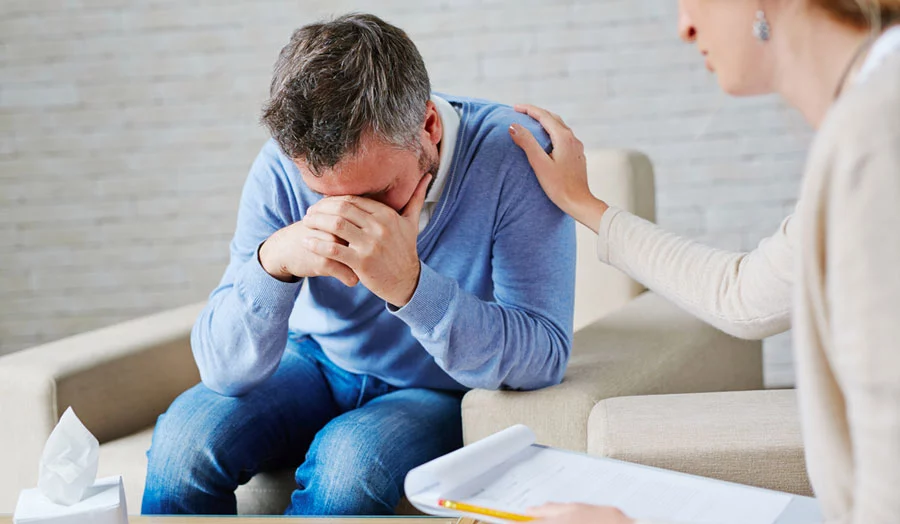Our Programs for Treating Complex Trauma Effectively
Complex Post Traumatic Stress Disorder (C-PTSD) is a serious mental health condition that can have debilitating effects on those affected by it if left untreated. It is important for individuals at risk for developing this disorder to be aware of the signs and symptoms so that they can seek help early on from a complex PTSD inpatient treatment program.
For those suffering from complex PTSD, inpatient treatment provides them with 24-hour access to medical professionals who specialize in treating this disorder along with other forms of trauma-related disorders such as addiction and depression.
Through a combination of individualized psychotherapy sessions, group activities, and recreational options, individuals can take steps toward recovery through an intensive inpatient program designed specifically for those suffering from complex PTSD.
Keep reading to learn more about complex trauma recovery, complex PTSD treatment centers, and how the programs at Catalina Behavioral Health can help you overcome complex PTSD today!
24 Hour PTSD and Trauma Treatment
What is the Nature of Complex PTSD?
Complex PTSD is related to a series of traumatic events over time or one prolonged event such as childhood neglect or abuse or other similar experiences that occur over many years. The CPTSD symptoms can be more severe than those of traditional PTSD because they are related to multiple traumas rather than just one.
Symptoms of complex posttraumatic stress disorder trauma can include feelings of shame or guilt about things that happened in the past; difficulty regulating emotions; increased reactivity; extreme emotional states like hopelessness; disassociation; difficulty trusting others; and difficulty managing relationships with family members or friends.
Additionally, people with complex PTSD may have trouble managing their thoughts and feelings which can manifest as compulsive behaviors such as substance abuse or self-harm.
It is worth noting that in cases of repressed trauma from childhood, those suffering from early traumatic events may not have complete memories from that time, as lost memory can also be a symptom of complex trauma as well as PTSD.
A Developing Condition Without a Formal Diagnostic Criteria
It’s important to note that Complex PTSD has not yet been added to the Diagnostic and Statistical Manual, but most mental health professionals still treat it as a mental health condition that can be distinguishable from PTSD.
Although they are a symptom and not the cause of traumatic disorders, our staff has also put together a repressed memories test worksheet and guide, to help those experiencing this often distressing symptom determine the severity of and nature of their recollections.
If you feel you or a loved one may have the symptoms of complex trauma, our informal CPTSD testing tool offers an initial assessment that can then help determine if further diagnosis and treatment are needed.
What Do the Best Complex PTSD Treatment Centers Offer?
Your healing and recovery process for post traumatic stress disorder is a deeply personal journey that’s shaped by your unique experiences and what you need most. When you walk through the doors of a reputable CPTSD treatment center such as Catalina, your path to recovery starts with a thorough initial assessment that helps medical professionals understand just how severe your PTSD symptoms are, any co occurring disorders you might be dealing with (like substance abuse or dissociative disorders), and how traumatic events have impacted your daily life.
This comprehensive evaluation is absolutely essential for developing a personalized treatment plan that addresses both your psychological trauma and any additional mental health conditions you’re facing.
Evidence based therapies are at the core of effective PTSD treatment, and here’s what you can expect. Dialectical behavior therapy (DBT) is frequently used to help you as a trauma survivor build emotion regulation skills and learn practical coping strategies for managing those intense feelings and trauma symptoms that can feel overwhelming.
Eye movement desensitization and reprocessing (EMDR) is another powerful tool that enables you to process traumatic experiences and reduce the emotional distress that comes with traumatic stress disorder PTSD.
What are the Benefits of Inpatient Complex Trauma Treatment?
With inpatient treatment from Complex PTSD at Catalina, you’ll receive ongoing support from your treatment provider, ensuring that your progress is closely monitored and your treatment plan is adjusted as your needs change.
The ultimate goal is to empower our clients to overcome PTSD, develop lasting healthy coping mechanisms that serve you well, and achieve the lasting recovery you deserve.
What are the Risk Factors for Developing Complex PTSD?

It is important to understand that not everyone who experiences a traumatic event or series of events will develop C-PTSD, PTSD or even PTSS. However, there are certain risk factors that may increase an individual’s likelihood of developing the disorder. These risk factors for developing complex PTSD include:
- Prolonged trauma or repeated exposure to complex trauma – Individuals who experience prolonged or repeated exposure to traumatic events are at a higher risk of developing C-PTSD than those who experience only one traumatic event.
Both obvious triggers, such as news stories about traumatic events, and less obvious triggers, like certain weather conditions that resemble the day of the trauma, can activate PTSD symptoms.
This could include individuals who have experienced prolonged abuse or those who serve in occupations regularly exposed to traumatic situations such as first responders or veterans.
- Genetic predisposition – Research has shown that genetics may play a role in the development of C-PTSD, particularly if someone has a family history of mental illness.
- Age – Studies have found that younger individuals are more likely to develop C-PTSD than adults because their brains are still developing and they may not have the coping skills necessary to process the complex trauma they have experienced.
- Lack of social support – Trauma survivors who do not have access to supportive relationships or resources are more likely to develop C-PTSD as they lack adequate means for dealing with their complex trauma.
Complex PTSD can significantly impact a person’s life, affecting daily functioning, relationships, and overall well-being.
How is Complex PTSD Different From Post Traumatic Stress Disorder?

Typical PTSD typically arises after experiencing a single traumatic event, such as a car accident, natural disaster, or sexual abuse. Symptoms of PTSD typically include flashbacks, nightmares, anxiety, depression, irritability, difficulty sleeping and feeling disconnected from reality.
Individuals may also experience panic attacks or physical symptoms such as headaches or stomach aches in response to reminders of the trauma they experienced. People with typical PTSD may sometimes feel like their life has been “on pause” since the traumatic event occurred and struggle to pick up where they left off before their trauma began.
Individuals who suffer from CPTSD have many of the same feelings, but they result from several different instances of complex trauma rather than one event. It can be hard to describe the many possible impacts of complex trauma, but having our guide to explaining CPTSD to loved ones can be very helpful.
To effectively treat PTSD and complex PTSD, it is important to use a comprehensive approach that combines medication, psychotherapy, and holistic therapies. This individualized treatment addresses the physical, psychological, and behavioral aspects of PTSD for the best possible outcomes.
What is Acute Stress Disorder?

Acute Stress Disorder (ASD) is a mental health condition that can occur within the first month following a traumatic incident. The symptoms of ASD are similar to those of Post Traumatic Stress Disorder (PTSD), but the two disorders differ in terms of their duration and severity.
Specifically, symptoms of ASD include sleep disturbances, nightmares or flashbacks about the trauma (re-experiencing symptoms), intense fear and anxiety related to reminders of the trauma, hyperarousal (feeling on edge), irritability or outbursts of anger, trouble concentrating, and an impaired ability to make decisions.
If these symptoms persist for more than one month, it may be time to begin to seek treatment for PTSD.
If you think you have ASD, it’s essential to seek professional help right away. A therapist can help you manage your symptoms through talk therapy and cognitive-behavioral therapies such as relaxation techniques, and guided imagery, and help with stress responses such as the freeze response to trauma, and aid in managing stress overall.
Therapists can also provide support and guidance as you process your experiences with complex trauma. Additionally, medication may be recommended if needed to help reduce symptoms of anxiety and depression.
Immediate Help for Mental Health Treatment
Co-Occurring Disorders Are Common With Complex Trauma
Co-occurring disorders (also known as dual diagnosis) refer to two or more mental health and/or substance use disorders occurring in a person at the same time. Some of the most common types of co-occurring disorders that accompany PTSD and CPTSD include drug abuse, eating disorders, and self-destructive behavior.
While these types of conditions often occur together, there is no single cause for them; various factors such as genetics, environment, and psychological influences can all contribute to the development of co-occurring disorders.
While not diagnoses such as Borderline Personality Disorder (BPD) or Obsessive Compulsive Disorder (OCD) that would indicate dual diagnosis treatment is needed, CPTSD has been known to affect the following areas heavily:
- Nightmares
- Noise sensitivity
- Parenting
- Romantic relationships
- Among others, these are four of the most common impacts CPTSD has on daily living.
Treatment For Complex PTSD & Other Mental Health Disorders

Residential PTSD Treatment Programs
Residential treatment programs provide 24-hour care for those suffering from complex PTSD. These programs are designed to help patients safely explore their emotions and work through their complex trauma in a supportive environment free from distractions.
Clients typically stay in residential programs for three weeks or longer to receive intensive therapy and medical treatment while receiving round-the-clock support from counselors and other healthcare professionals.
While in residential care, you will likely engage in the following types of treatment:
Group Therapy
Group therapy provides an opportunity for patients to share their struggles and experiences with others who are going through similar things.
Group sessions allow individuals to learn coping skills from each other as well as gain valuable insight into how they can better manage their symptoms. Group therapy also provides a sense of community which can be very helpful while trying to recover.
Medication
While medication cannot cure complex PTSD, it can help improve symptoms such as anxiety or depression that may interfere with daily life or impede progress in therapy. Antidepressants, anti-anxiety medications, antipsychotics, mood stabilizers, and sedatives are all commonly prescribed medications used to treat complex PTSD symptoms.
Individual Therapy

Individual therapy allows patients to discuss their feelings in a more private setting where they feel supported but not overwhelmed by the presence of others.
During individual sessions, therapists may use various techniques such as cognitive behavioral therapy (CBT), dialectical behavior therapy (DBT), or psychodynamic therapy to help the patient work through issues and gain insight into their situation.
Reviewing the differences between CBT and DBT will be done during your time with us, and a combination specific to your treatment goals will be employed for the best possible outcomes of your stay at Catalina.
Trauma Therapy
Trauma therapies can be used to help patients process traumatic events and memories in a safe way so they can begin to heal from them instead of avoiding them out of fear or shame. One form of evidence based trauma therapy involves inducing tremors to release the tension of trauma held in the body. Another of the most common types of trauma therapies is eye movement desensitization and reprocessing (EMDR).
In using EMDR for complex trauma, the focus is on using eye movements or other forms of bilateral stimulation – simultaneous stimulation of both sides of the brain – to help reprocess the information associated with the traumatic event.
The therapist will ask the client to recall a traumatic memory while focusing on a stimulus such as eye movements or hand taps; this helps create new neural pathways for a brain affected by trauma, which can lead to improved overall health as well as mental health outcomes.
This allows them to make sense of what happened and see it more objectively. EMDR has been found to be particularly effective for reducing symptoms of PTSD such as flashbacks and intrusive thoughts as well as anxiety-related disorders such as social anxiety disorder or panic disorder.
Healthy Lifestyle Changes

In addition to therapy, there are several lifestyle changes that can help improve your overall well-being when dealing with C-PTSD or other mental health disorders. These include:
- Getting adequate sleep each night (at least 6-8 hours)
- Eating a healthy diet
- Exercising regularly
- Limiting alcohol consumption or avoiding it altogether
- Practicing deep breathing techniques when feeling overwhelmed or stressed
- Practicing mindfulness meditation
- Spending time outdoors in nature whenever possible
- Surrounding yourself with supportive people who understand your struggles and have your best interests at heart
- Seeking out creative activities like painting or writing can provide an outlet for your feelings which may otherwise feel overwhelming at times
The most important thing is to find what works best for you so you can live a healthy and fulfilling life and full life expectancy despite any challenges you might face along the way.
Get Licensed Trauma and PTSD Treatment
Get Help With Complex Post Traumatic Stress Disorder Now
No one should have to face Complex PTSD symptoms and the effects of complex trauma alone. There are resources available to help those who have suffered from prolonged or repeated traumas become whole again through therapy, support groups, and other forms of treatment programs designed specifically for this purpose.
If you think you may be experiencing symptoms related to complex trauma don’t hesitate to contact Catalina Behavioral Health. We can help you get the treatment you need and deserve.
All calls are confidential, so please reach out in confidence today and get options now!







